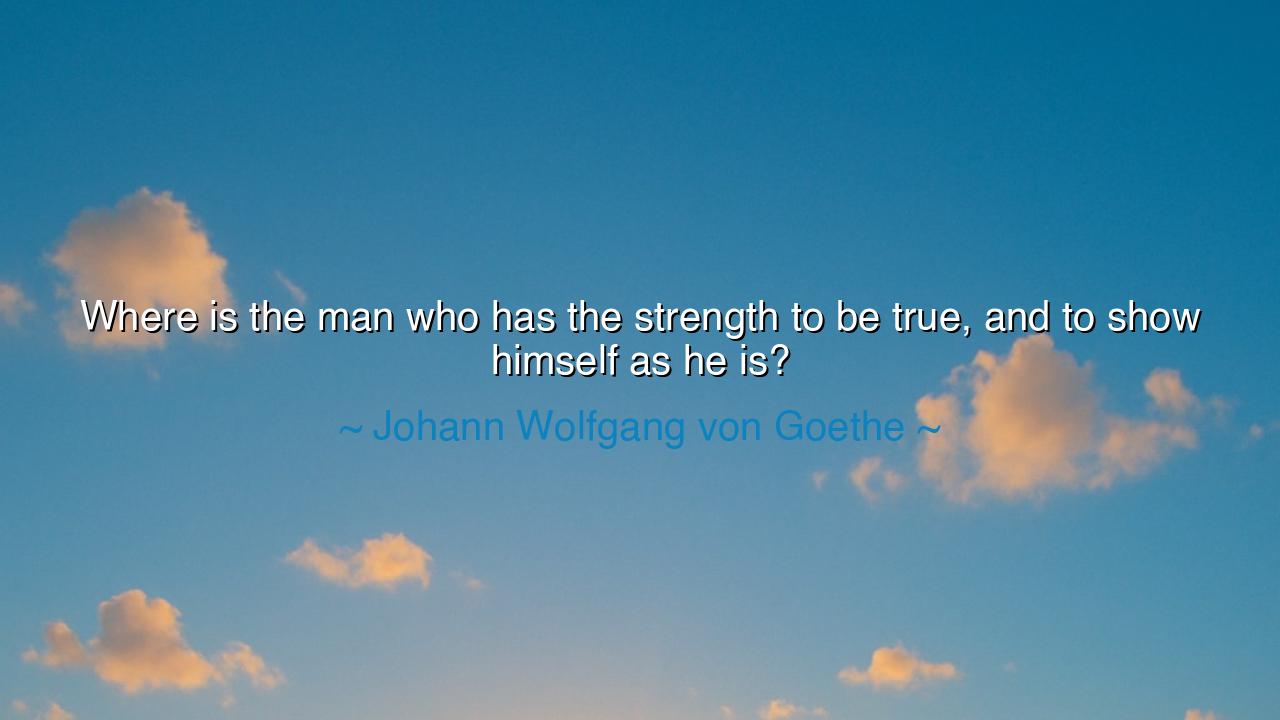
Where is the man who has the strength to be true, and to show






Hear now the solemn cry of Johann Wolfgang von Goethe, who asked with piercing clarity: “Where is the man who has the strength to be true, and to show himself as he is?” This question, uttered not lightly but with the weight of centuries, strikes at the heart of human existence. For the world has ever been filled with masks—men hiding their doubts behind pride, their fears behind bravado, their hearts behind silence. Goethe calls us to strip away the veils, to stand before heaven and earth with the courage of naked truth.
The origin of this quote lies in Goethe’s lifelong exploration of the human soul. As poet, philosopher, and statesman, he was no stranger to the complexities of man’s inner life. He saw how society pressures the individual to conform, how fear of judgment drives men to falsehood, and how pride blinds them from acknowledging weakness. Yet he also believed in the greatness that arises when one dares to live authentically. His question is not merely rhetorical; it is a challenge thrown to all who hear: dare you be true, not in secret, but openly?
This struggle is as old as history itself. Recall the tale of Diogenes the Cynic, who roamed the streets of Athens with lamp in hand, declaring that he searched for “an honest man.” He found none, for all were cloaked in pretense and ambition. Yet Diogenes himself lived in fearless truth, sleeping in his barrel, mocking kings, and refusing to bow before custom. In him we see Goethe’s question embodied: the strength to be true is rare, but when found, it shines brighter than gold or power.
But let us not imagine that truth is only a matter of words. To “show oneself as he is” requires both humility and courage. Humility, to admit weakness, failure, and ignorance. Courage, to stand by convictions even when the world condemns. Most men hide behind false strength, fearing that exposure will bring ruin. Yet paradoxically, it is openness that breeds respect, and authenticity that inspires trust. In the end, the man who is false becomes brittle and broken, while the man who is true becomes unshakable.
Consider Abraham Lincoln, whose life was marked not by flawless success but by a relentless honesty about his struggles. He confessed his doubts, his sorrows, his fears, and yet pressed on with integrity. In an age of political calculation, his authenticity became his greatest strength. People trusted him because he did not cloak himself in falsehood. His leadership through the American Civil War was not born of invincible pride, but of a spirit strong enough to admit weakness and yet endure. He lived Goethe’s question, proving that truth and strength are one.
The lesson, therefore, is this: to be true is the highest form of strength. It is easy to wear the mask that pleases others, easy to speak words that flatter, easy to hide scars in silence. But the path of truth demands that you reveal yourself as you are, without fear. And in that revelation lies power—for truth may wound, but it also heals; it may humble, but it also elevates. To live otherwise is to be a shadow of oneself, never whole, never free.
Practical action is clear. Begin with honesty in small things: admit mistakes, confess ignorance, speak your heart even when it trembles. Do not fear to reveal your struggles, for in doing so you reveal also your humanity. Seek not to impress, but to be authentic; seek not to appear strong, but to be real. For when you live in truth, you carry within you an invincible light, one that no mask can match.
Thus, O seeker, hear Goethe’s call: the man of strength is not he who conquers others, but he who dares to stand revealed. Such a man walks with dignity, for he is divided no more. Such a man inspires others, for his truth awakens theirs. And such a man leaves behind a legacy not of illusion, but of enduring greatness. Where is such a man? Let it be you.






AAdministratorAdministrator
Welcome, honored guests. Please leave a comment, we will respond soon